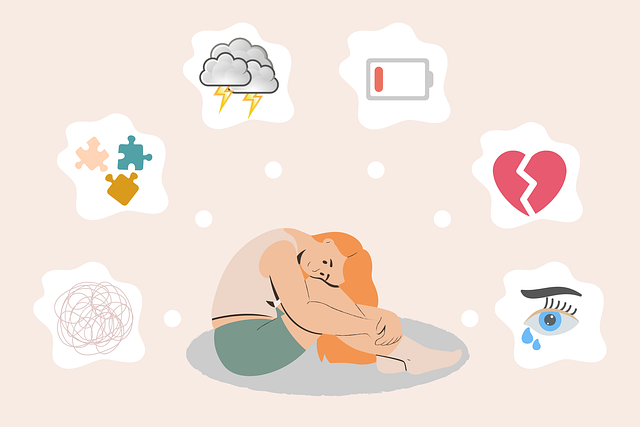Adolescent teens with chronic illnesses face unique emotional challenges that disrupt mood regulation, leading to anxiety and depression. Tailored therapy, including Cognitive Behavioral Therapy (CBT) and mindfulness meditation, is crucial for holistic mood management. CBT equips teens with coping strategies to address negative thought patterns, while mindfulness practices enhance stress management skills. Lifestyle modifications like exercise, nutrition, and sleep also improve mental well-being. Support systems and culturally competent healthcare providers further empower teens, ensuring accessible resources like the Mental Wellness Podcast Series contribute to better mental health outcomes.
Mood regulation is a crucial aspect of managing chronic illnesses for adolescent teens. This comprehensive guide explores effective strategies to help teens navigate their emotional well-being. From understanding the unique challenges they face, we delve into powerful tools like Cognitive-Behavioral Therapy (CBT) and mindfulness practices. Additionally, discover how lifestyle adjustments and supportive systems can foster sustained mood stability. Empowering teens with these strategies is a game-changer in managing chronic illnesses.
- Understanding Mood Regulation for Teens with Chronic Illnesses
- Cognitive-Behavioral Therapy (CBT): A Powerful Tool for Emotion Management
- Mindfulness and Meditation Practices for Daily Coping
- Lifestyle Adjustments and Support Systems for Sustained Mood Stability
Understanding Mood Regulation for Teens with Chronic Illnesses

For adolescent teens living with chronic illnesses, understanding and managing their moods is a vital aspect of their overall healthcare. This age group often faces unique challenges as they navigate both physical health issues and the emotional rollercoaster of adolescence. Chronic illness can significantly impact emotional regulation, leading to frequent mood swings, anxiety, or even depression. Therefore, implementing effective mood regulation strategies becomes essential in their therapeutic journey.
Therapy plays a pivotal role in equipping these teens with tools to manage their moods. Through therapy sessions, they can learn coping mechanisms such as mindfulness meditation and emotional regulation techniques tailored to their specific needs. Cultural competency training for healthcare providers is also crucial, ensuring that the support offered is sensitive to diverse cultural backgrounds, which can significantly influence an adolescent’s experience of chronic illness and mood management.
Cognitive-Behavioral Therapy (CBT): A Powerful Tool for Emotion Management

Cognitive Behavioral Therapy (CBT) has emerged as a powerful tool in the realm of emotion management, particularly for adolescent teens grappling with chronic illnesses. This evidence-based therapy focuses on identifying and challenging negative thought patterns that can exacerbate emotional distress. By teaching individuals to recognize and change these thoughts, CBT empowers them to better navigate their feelings and behaviors, fostering improved mental health outcomes.
For adolescents dealing with the challenges of a chronic illness, CBT offers valuable coping mechanisms tailored to their unique experiences. Through the design of targeted mental health education programs and structured self-care routine development, CBT equips teens with essential emotional well-being promotion techniques. By addressing the root causes of distress, this therapy not only enhances overall resilience but also promotes healthier ways of managing illness-related stress, ultimately improving quality of life.
Mindfulness and Meditation Practices for Daily Coping

Mindfulness and meditation practices have emerged as powerful tools for adolescent teens navigating chronic illnesses. These techniques offer a form of therapy that encourages present-moment awareness, helping young individuals cope with the emotional challenges associated with their conditions. By integrating mindfulness into daily routines, teens can enhance their stress management skills and build resilience. Simple meditation exercises, such as focusing on the breath or scanning the body for tension, provide an accessible way to initiate this process, allowing them to take charge of their mental health.
For mental health professionals, incorporating these practices into treatment plans is a strategic risk management planning approach. It empowers adolescents to engage in self-care and potentially reduce reliance on external support. Moreover, community outreach program implementations can facilitate the dissemination of mindfulness techniques, ensuring that teens from diverse backgrounds have access to these beneficial coping strategies.
Lifestyle Adjustments and Support Systems for Sustained Mood Stability

Maintaining mood stability requires a holistic approach, especially for adolescents navigating chronic illnesses. Lifestyle adjustments play a pivotal role in this journey. Encouraging regular physical activity, a balanced diet, and adequate sleep can significantly impact mental well-being. These simple yet effective changes can reduce symptoms of depression and anxiety, fostering a sense of control and empowerment.
Support systems are equally vital for sustained mood stability. Connecting with peers who understand their experiences through support groups or online communities can provide a safe space for sharing and validation. Additionally, therapy tailored to adolescent needs, such as cognitive-behavioral therapy (CBT), has proven effective in managing chronic illnesses and improving mental health outcomes. Engaging with healthcare providers who offer cultural competency training ensures that teens receive sensitive and culturally responsive care. The Mental Wellness Podcast Series Production can also offer valuable resources and insights into various aspects of mental wellness, providing an accessible way to learn and connect with others on similar paths.
For adolescent teens with chronic illnesses, managing mood swings is a vital aspect of their overall well-being. By combining cognitive-behavioral therapy (CBT), mindfulness practices, lifestyle adjustments, and strong support systems, parents and healthcare providers can empower teens to regulate their emotions effectively. Integrating these strategies into daily routines offers a holistic approach to enhancing mood stability, enabling adolescents to navigate the challenges of their condition with greater resilience and a improved quality of life. This comprehensive framework is key to fostering emotional health in the face of chronic illness.














